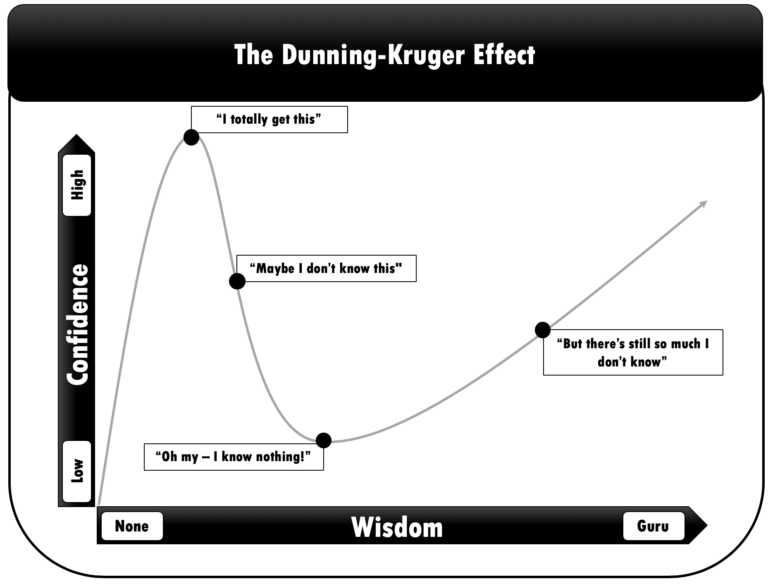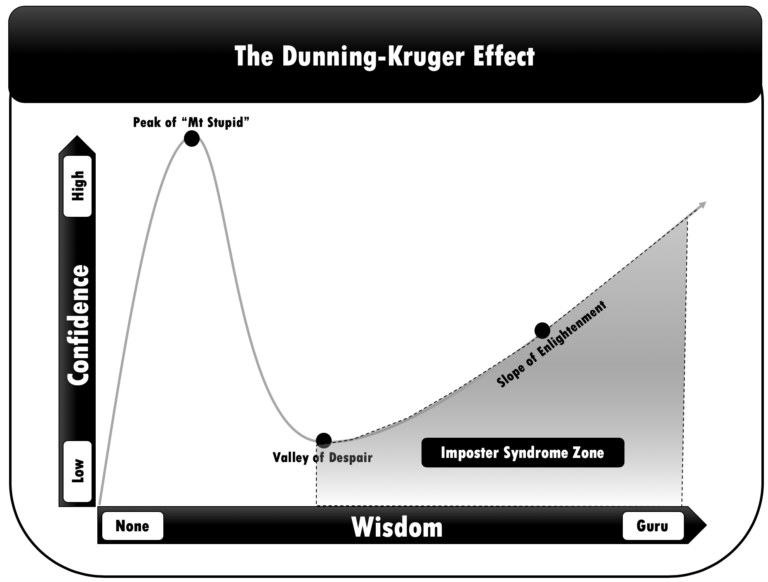In this first of a two-post series, we dive deep into what imposter syndrome is, how and why it impacts physicians, and its resulting impacts.
Grab your safari hat (it’ll become apparent below) and get to reading!

Imposter Syndrome (n)
Imposter syndrome is not truly a syndrome in the medical sense (like a condition or DSM diagnosis), but instead refers to a collection of thoughts and feelings. Thus, it is sometimes instead referred to as “imposterism,” which is my preferred nomenclature (if only because it’s shorter—plus, who doesn’t love a good “-ism?”).
I should also note that the predominant spelling is “impostor” with an “o.” But that looks ridiculous to me, and I prefer spelling it with an “e,” which is an acceptable albeit less common alternative. So you’re stuck with my preference #sorrynotsorry.
Anyway, imposterism is defined as a persistent perceived lack of expertise and fear of being called out as incompetent or a fraud.
Success is attributed to luck or chance. Innate ability or aptitude is disregarded in favor of these external factors.
At its core, imposterism is a faulty belief system driven by self-doubt. More on that in a moment.
Imposterism Begins
Imposterism was first described in 1978 by psychologists Drs. Pauline Clance and Suzanne Imes.
They studied success attribution in professional women and noted a significant gender-based dichotomy wherein women disavowed their accomplishments to a much higher degree compared to men. In fact, they believed imposterism solely affected women!
Subsequent research has disproved this, though women, as well as other minority or non-dominant groups, are disproportionately affected. Studies show that 70% of people experience imposterism. And the remaining 30% must be sociopaths!
Clane and Imes postulated that imposterism was the manifestation of internalized societal conditioning.
That is, women (because that’s whom they studied) were socially seen as less capable, which they subconsciously believed. Thus any achievement generated cognitive dissonance that could only be reconciled if considered fake or due to luck/chance.
Clance and Imes were right! Social conditioning sinisterly inculcates messaging of inferiority in non-dominant groups. Basically, imposterism is the response for handling the breakdown of a narrative that has been ingrained. But this is only half of the explanation.
The other requisite ingredient is denigrating internal dialogue. This is that internal critic that is always shooting you down and comparing you to others.
Okay, okay, yes, this dialogue derives from the conditioning, but it’s not always present so deserves to be called out separately.
So there it is—social conditioning plus harsh, self-critical thought! Voila! You have imposterism!
The Two Paradoxes
Now the fascinating thing about imposterism is the faulty belief system mentioned earlier.
Why?
Because imposterism tends to impact incredibly capable and successful people who are least likely to be imposters! (Paradox #1)
They don’t believe all the external evidence that they are awesome even as those around them admire them with awe.
This conviction of not being good enough really stems from a place of not feeling worthy. I’ve discussed this elsewhere in regards to perfectionism.
Organizational psychologist, Dr. Adam Grant, succinctly sums up Paradox #2:
“- Others believe in you
– You don’t believe in yourself
– Yet you believe yourself instead of them
If you doubt yourself, shouldn’t you also doubt your judgment of yourself?”
Umm, have you met me? If there’s one achievement I wholeheartedly take credit for, it’s self-judgment. Got that one on lock!
Don't Just Do Something, Stand There!
Our brains are so powerful that we can believe completely erroneous thoughts about reality (without diving into the question of “what really is reality?”). For example: crippling self-doubt about our abilities despite all evidence to the contrary.
Don’t believe me? See my post on unconscious bias and how we store data inputs and generate thoughts.
Unfortunately, that self-doubt is a function of normal human brains doing normal human brain stuff.
Evolutionarily, we are herd animals, and herd mentality centers on the ideas of safety in numbers and avoidance of being singled out.
It’s much easier to be singled out if you’re blatantly standing out. And that’s dangerous.
A zebra who dyes their coat pink is going to be a lot easier to target by a pack of hungry lionesses on the Serengeti.
Similarly, achievement and success often garner us praise which can cause discomfort because it shines the spotlight on us. The lionesses are waiting!
Furthermore, being exposed as a fraud runs the risk of being expelled from the safety of the herd. We think we’ll be exposed if/when we err, so with imposterism there’s a heightened fear of making mistakes.
Isn't Just This Humility? What's the Big Deal?
No. Because imposterism derives from a place of self-doubt, of feeling unworthy.
True humility comes from healthy confidence, awareness, and gratitude—a place of worthiness.
In feeling unworthy, imposterism creates and perpetuates misery.
You’re unable to show up fully present because of this leech on your mental bandwidth that not only takes away “computing power,” but also casts doubt on the rest of your processing and/or performance.
The inability to enjoy self-validation means we seek it externally. We rely on what others think of us to fill our cup of worthiness.
In doing so, we hold ourselves back from our full potential; we undermine our success. We might even avoid pursuing that which we desire because it’s too “risky” and, again, might put us in the limelight.
Flying under the radar means we avoid inviting scrutiny that may uncover the imposters that we are!
That’s no way to live!
Chronic stress from imposterism robs our pursuits and triumphs of their joy. It’s been linked to anxiety and depression as well as higher rates of burnout and suicide.
Imposterism is tied intimately to perfectionism and arrival fallacies. For example, it’s not uncommon to think, “Once I achieve x, I’ll finally prove my worth.”
However, once x is achieved, we simply move the goalposts further back and start the cycle over again.
Wait, My Doctor Is an Imposter?
No…and yes. A physician is a physician. Unfortunately, we’re also people.
Come again?
The potential for imposterism exists for everyone, but it is more prevalent in highly competitive fields like medicine where the stakes for errors can be high.
The funnel (or gauntlet) to becoming a physician increases in competitiveness at each stage. And at each stage, you may find yourself surrounded by ever more impressive colleagues.
It’s easy to lose sight of the fact that you made it through and instead worry if you’ll continue to do so, especially when other super-qualified candidates did not.
It doesn’t help that several of the stages lack transparency or succumb to cultures favoring who you know or “good ol’ boys club” mentalities.
We haven’t even gotten to the practice of medicine!
Intern year is one colossal experiment in imposterism, right? You’re abruptly thrust head first into patient care where your orders and signatures suddenly have meaning and cause things to be done…to people!
In subsequent years you’re learning to manage your team of patients and learners. The culture of “see one, do one, teach one” doesn’t leave much room for absorbing and mastering. It’s essentially codified “fake it til you make it!” How does that NOT engender imposterism?
I missed that—I’m supposed to insert that catheter where?!
But Wait, There's more!
Imposterism doesn’t stop in training, it plagues plenty of attendings too. Medicine may or may not get easier as an attending, but the stakes are definitely greater when the buck stops with you.
Miss something once and now you over-evaluate or over-order testing? Or conversely, immediately refer it out?
I come across this in my charting clients who double or triple-check their notes and work, striving to prove their knowledge and worth via ponderous notes.
They are horrified of appearing “dumb” to their colleagues.
Or maybe they were burned by a confusing patient presentation that in hindsight seemed obvious. (Hint: it’s usually not that obvious.) And now their penance is life-disrupting time spent on obsessively thorough notes.
It’s all too easy to Monday morning quarterback even ourselves.
Want to tell colleagues about it? Well, you may not find much support!
Ingrained imposterism keeps many a physician pretending like everything is easy and obvious because that’s how they think it is for everyone else. Can’t let your guard down because those lionesses are always poised to pounce!
Medicine is messy and complex and many patients forget to read the textbook beforehand about how their disease processes are supposed to present when they see us. Rude.
However, the single most illustrative example is the imposterism stoked or even created de novo (if not present before) by a malpractice suit.
Nothing makes physicians feel like frauds like being named in a suit, even when for many it’s a statistical certainty—a matter of when, not if.
I’ll spare you my views on this aspect of the medicolegal system. Suffice it to say that the process seems intentionally designed to be traumatic.
It’s no surprise that cover your ass (CYA) medicine exists, again resulting in over-testing and/or overly detailed notes.
You Can't Sound Smart Without Mentioning...
The Dunning-Kruger (DK) Effect. In fact, you may come off as an imposter….
The breadth and depth of the corpus of medical knowledge is incredible. No one can actually know everything unless they hyper-specialize (like only deal with disease in the isthmus of the thyroid gland) or studied online at The University of You’re Full of Sh!t.
This is where the DK Effect comes in. It looks at the cognitive bias people have towards assessing their own ability.
It’s easier to visualize:

As you can see, with a little bit of knowledge confidence can shoot up rapidly. Then as more is learned, confidence starts to wane because of the realization of how little is truly understood. Finally, there’s the gradual climb where confidence builds with wisdom.
From the nadir in confidence on towards the right is the imposter syndrome zone (see below) where heightened awareness of lack of total knowledge can limit confidence even when current knowledge levels are sufficient for success.

As Socrates famously said: “The only true wisdom is in knowing you know nothing, Jon Snow.”
Okay, I may have added on to the end of that, but you get the point.
Duck Out Before I'm Exposed
I’m sure this post is full of errors but you’re not a pack of lionesses, right?
As you can see, imposterism is pervasive especially in medicine. Like perfectionism, it’s another set of faulty beliefs that impedes our happiness and even causes despair and suffering.
A lot of this post may have resonated with you, and if so, I’m glad. Imposterism is woefully addressed in our training and beyond.
And that needs to change.
Next week we’ll dive a little deeper into imposterism in medicine before exploring how we can address it both at the individual and system level. So be sure to tune in next week!
Are you a zebra with a pink coat? Where does imposterism show up in your life? Let me know in the comments!
If you haven’t subscribed to my email list, then do so below so you don’t miss my new posts or my weekly updates (only for subscribers).
I’d also be most appreciative if you shared this post with anyone whom you think would benefit from the content or message of the blog. They may similarly be most appreciative 
